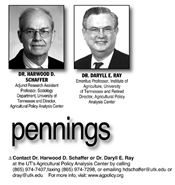|
Physical Sciences Are Mathematically Precise; Social Sciences Like Economics Are Not

Two weeks ago, we launched this column series by declaring our intention to talk “about science, philosophy, and economics as they relate to the agricultural sector in the US and around the world.”
In that first column we identified “what we believe to be a scientifically verifiable set of characteristics of food production, marketing, and consumption” (https://tinyurl.com/5arr5sqz) that should have an impact on the types of food and agricultural policies that are adopted at the national and international levels.
Last week’s column ventured into the philosophical realm (https://tinyurl.com/4nb3ognk). We indicated that we believe there is widespread acceptance of the idea that “from [both] humanitarian and religious perspectives it is unacceptable to allow people to die of hunger or suffer from malnutrition and stunting as the result of not being able to gain access to a stable, nutritious, culturally appropriate diet.”
In this column we examine economic beliefs and the way they affect both agricultural and food policies.
From the New Deal through the early part of our careers, economics was seen as a social science that took human behavior seriously and sought to understand how humans made economic decisions and how these decisions affected the production and distribution of food.
Economics as a social science sought to provide policy makers with a solid empirical basis on which they could develop agricultural and food policies that benefitted both the producers and consumers of agricultural products.
Along the way, economics as an academic discipline made the move from seeing itself as a social science to seeing itself as a hard science akin to physics with its elegant mathematical equations like those in physics.
This turn shifted economic teaching, particularly the teaching of agricultural economics, from an emphasis on human behavior with all of its foibles, to an economics that was based on libertarian philosophical principles of free markets, minimal government involvement, and elegant mathematical constructions.
Daryll lived through this transition period, but remained committed to the social science approach to economics, especially as it affected agricultural and food policies.
Harwood came to work with Daryll at the Agricultural Policy Analysis Center in 2000 and found that Daryll’s ideas matched up with the economic issues Harwood had seen facing farmers in the parishes he had served for 30 years. This was in contrast to the ideas and agricultural policies of Agricultural Economists and/or Secretaries of Agriculture like Earl Butz and Dan Glickman whose ideas and policy prescriptions seemed to make things worse for farmers.
When Harwood, an undergraduate math major, took his first microeconomics class in 2002 he was impressed with the elegance of the equations being taught. But for him the problem was that they did not match up with the human economic behavior he observed over his lifetime.
When it comes to policy, the two of us believe that agricultural and food policy ought to be based on the way the world really works (science) and not abstract libertarian ideas.
Rather than ignoring the well documented low price-elasticity of both supply and demand when agricultural commodity prices are low and then shoveling money at farmers to keep them from going bankrupt, we believe in policies that protect farmers when prices are low and consumers when prices are high. We believe that buyers in the market should pay the full cost of production for the agricultural commodities they purchase.
We believe in policies that ensure that the world has a reserve of agricultural staples when an event like the drought of 2012 occurs and there is not enough corn to go around. We believe in humane food support programs here and around the world that meet the needs of people on the economic margins so that no adult or child suffers from undernutrition as the result of a lack of economic resources.
We believe that economics as an academic discipline should not abandon its roots as a social science. ∆
DR. HARWOOD D. SCHAFFER: Adjunct Research Assistant Professor, Sociology Department, University of Tennessee and Director, Agricultural Policy Analysis Center
DR. DARYLL E. RAY: Emeritus Professor, Institute of Agriculture, University of Tennessee and Retired Director, Agricultural Policy Analysis Center
|
|